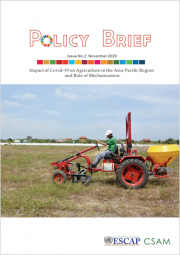
CSAM Policy Brief (Issue No.2, November 2020): Impact of Covid-19 on Agriculture in the Asia-Pacific Region and Role of Mechanization
The impact of the coronavirus disease pandemic on the agricultural sector has brought unprecedented challenges in the Asia-Pacific region. At this juncture, it is important to undertake a closer analysis of the effect of the pandemic on agriculture in the region, with particular attention to resource-poor smallholder farmers and low-wage migrant agricultural workers. In addition, it is vital to identify solutions that can help member States ‘build back better’ the agricultural sector. The wide-ranging impacts of the pandemic on the region’s agricultural sector include decrease in production in some areas, disruption in marketing and sales of agricultural produce, shortages in supply of agricultural labour and other inputs, decrease in farmers’ and farm labourers’ income, and worsening of food security. At the same time, many examples of positive and timely government interventions have emerged which have helped to contain and alleviate adverse effects.
Sustainable agricultural mechanization is among the solutions that can strengthen the resilience of the farming community to crises. Application of agricultural machinery through an inclusive and sustainable approach can introduce greater speed of operations in the food production process, increase yield and output, reduce production costs, increase cropping intensity, reduce postharvest losses, save manpower and reduce the drudgery of agricultural work. All of these can, in turn, contribute to recovery from crises and strengthen the resilience of farmers and the agricultural sector as a whole to future shocks.
In order to optimize the contribution of sustainable agricultural mechanization to recovery and resilience in the agricultural sector, it is recommended to address the needs of smallholder farmers, strengthen rural infrastructure, promote ICT-enabled/ digital technologies, encourage research and development, and leverage the potential of mechanization to generate employment opportunities for youth.
